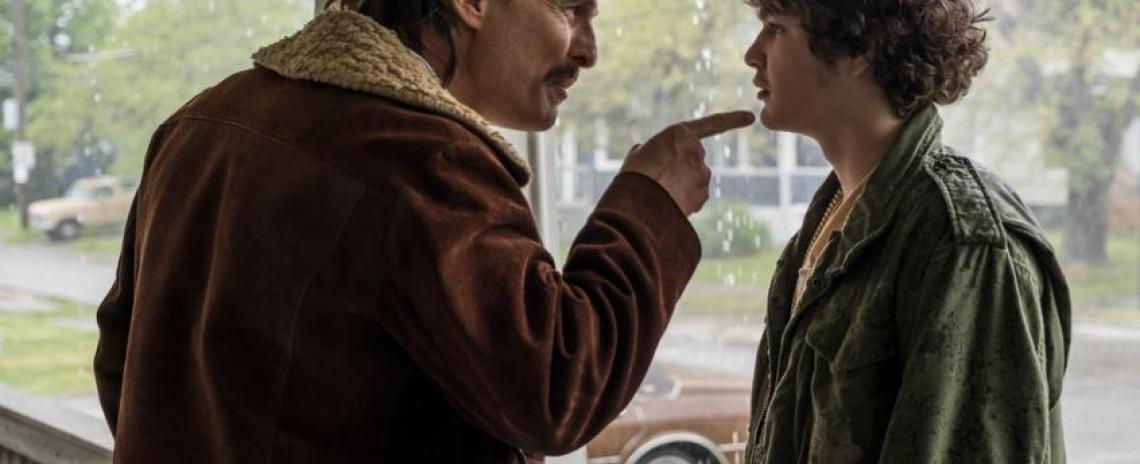When Rick Wershe Jr. (Richie Merritt) begins peddling dope on the streets of Detroit, Mich., he’s a mere 15 years old. He’s doing so at the behest of a pair of FBI agents (Jennifer Jason Leigh and Rory Cochrane) and a local cop (Brian Tyree Henry), three officials who recognize the young man’s charisma and Zelig-like social adaptability. They utilize those natural charms as part of a grand scheme to crack down on a trail of corruption leading straight to the top of the local government. By the time he’s 18 years old, “White Boy Rick” – as he’s named by his drug-dealing cohorts – has survived a bullet to the gut, become one of the state’s biggest narcotics kingpins, and is about to begin a life sentence in a federal penitentiary, leaving behind his newborn baby.
Strictly speaking, these are not spoilers for White Boy Rick, as director Yann Demange’s new film is based on the true story of Rick Wershe Jr., a figure notable for having been slapped with the longest sentence ever handed down for a non-violent crime in his home state. Screenwriters Andy Weiss, Logan Miller, and Noah Miller – the latter identical twin brothers – structure their dramatization around people who seek to manipulate and support Rick. Richard Wershe Sr. (Matthew McConaughey) is a charismatic but down-on-his-luck arms dealer, a man who haggles over the price of fake AK-47s at a gun show only to turn around and sell them with his custom silencers at a steep markup. Wershe Sr. professes to bootstrapping ideals about supporting his immediate family – his elderly father (Bruce Dern) and mother (Piper Laurie), as well as his drug-addicted daughter, Dawn (Bel Powley) – but, against his better fatherly judgment, he still involves his son in the day-to-day details of his criminal enterprise.
Although Rich’s father puts his foot down about his son getting involved with the government authorities, the wide-eyed youngster is attracted like a moth to the flame that is a luxurious life in the drug underground. He rather easily gets “in” with the local operation, run by the Curry family. The eldest brother and leader of the group, Johnny “Lil Man” (Jonathan Majors), bestows Rick with his titular nickname. The volatile and violent Johnny becomes Rick’s main adversary in the three-plus years that this film spans, covering Rick’s quick ascension into notoriety and wealth, donning furs and keeping rolls of cash under his twin-size bed at his father’s house. His descent is even quicker: Years after the FBI stopped working with Rick, they elect to double-cross him, ultimately landing the 17-year-old in prison.
If these narrative plot points feel familiar, it’s less likely because of the newsworthiness of the tale and more likely due to the film’s reverence for its genre. The film is so indebted to the many “based on a true story” crime sagas that came before it – Scorsese’s GoodFellas (1990), Ted Demme’s Blow (2001), and even David O’Russell’s irreverent American Hustle (2013) – that its remix of borrowed ideas means it only trembles in its forebears’ shadows.
Even attempting to skim the surface of issues within the genre and the societies such films typically depict doesn’t elevate the proceedings. Rick adopts African-American Vernacular English and black style in order to fit in, but the film is content to merely depict this act of cultural appropriation instead of mining it for thematic substance. Illustrating the government-sponsored introduction of crack into drug-embattled neighborhoods is about as far as the film is willing to delve into government corruption and the oppression of people of color. The celebration of excess and the inevitable downfall of those who participate in it aren't even that enticing here.
What White Boy Rick lacks in brains and brawn, it makes up for in humanity via its performers. As the junior Wesche, Meritt is a minor revelation in his screen debut: charming when his roleplaying requires it and equal parts reserved and playful in his more natural persona. His final scene with his major sparring partner, McConaughey, is the finest for actors in this film – masculine posturing incited by unstoppable regret and disappointment. In the past few years, McConaughey has been upending his swaggering persona, eventually winning an Academy Award for his portrayal of a renegade AIDS-medication peddler in Dallas Buyers Club (2013). Here, the subversion is still present but in a lower register, making this performance less of a stunt and more a well-rounded screen character.
Any film with Laurie and Dern as an aged married couple is virtually guaranteed to be elevated by their presence, and White Boy Rick doesn’t fail there. They, along with Henry, Powley, and Eddie Marsan, are able to deliver moments of levity that do more to move the film forward than does its rote, plodding story. Based on his direction of this superb cast of veteran character actors and fresh-faced newcomers, as well as the film’s infrequent formal flourishes, it’s probable that Demange, who made the notable ‘71 (2014), has more memorable work in his future. White Boy Rick, however, is purely forgettable.
Rating: C


